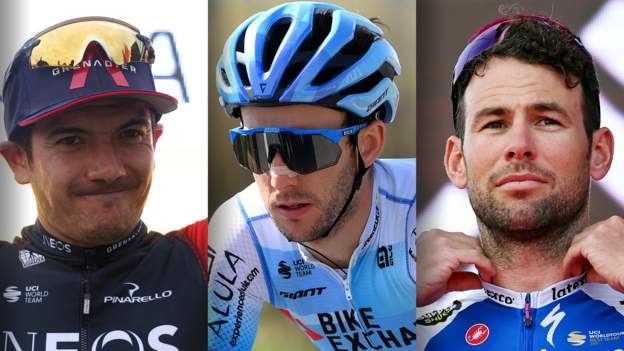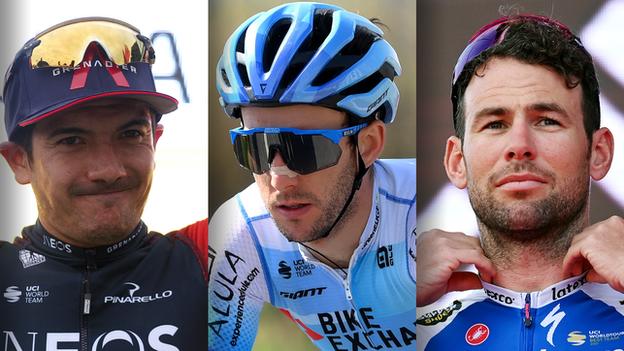
The Giro d’Italia starts in Budapest on Friday and concludes with an individual time trial in Verona on 29 May.
The 21-stage race travels a 3,446km (2,141 miles) route across flat sprinter-friendly days, time trials and gruelling mountain climbs.
Here, BBC Sport looks at everything you need to know about the race.
What’s the significance of the Giro?
A total of 176 riders from 22 different teams will participate in the 105th edition the three-week race, which comes off the back of the spring Classics and is traditionally the first of cycling’s three ‘Grand Tours’ on the calendar.
Established in 1909 by newspaper La Gazzetta dello Sport, the Giro was won five times by Alfredo Binda, Fausto Coppi and Eddy Merckx, with this year’s Grande Partenza from Hungary coming two years later than planned because of the coronavirus pandemic.
In recent years, Ineos Grenadiers have held sway at the top of the general classification.
Colombian Egan Bernal and British riders Tao Geoghegan Hart and Chris Froome – when they were Team Sky – have collected the maglia rosa in three of the past four years, and in the only season they did not, current Ineos rider Richard Carapaz took the general classification glory.
Which British riders are racing?
After a sensational return at the top of the sport in which Mark Cavendish equal Merckx’s Tour de France record of 34 stage wins in 2021, he arrives at the Giro as one of the headline acts.
Cavendish is back at the race for Quick Step-Alpha Vinyl after a nine-year absence, having claimed five stages to win the points classification on his last appearance in 2013. The sprinter, who turns 37 on the 14th day of the race, has won 15 stages in total at the Giro.
Alongside him, he will have fellow Briton James Knox, Davide Ballerini and Michael Morkov – one of the best lead-out men in the business. As a result, Cavendish will hope to deliver performances – and possibly the maglia ciclamino, for winning the points classification – that persuade team boss Patrick Lefevere to include him at the Tour.
While Cavendish will be eyeing victories on the six stages that will specifically favour the quick men in the peloton, Simon Yates will be among the main general classification favourites as he launches a fifth tilt for the maglia rosa.
The 29-year-old already has a Grand Tour success on his CV after winning the Vuelta a Espana in 2018 but has unfinished business when it comes to the Giro.
He spent 13 days in the leaders’ pink jersey before cracking on stage 19 in 2018 as Froome launched a race-winning attack and finished eighth in 2019.
Covid forced him to abandon in 2020 but last year he recovered from a sluggish start to win stage 19 and finish third overall.
Climber Hugh Carthy will be chaperoned by Simon Carr and former Olympic team pursuit champion Owain Doull as he leads the EF Education-EasyPost team, attempting to build on his eighth-placed finish in 2021 and a third place in the 2020 Vuelta.
Elsewhere, Ben Tulett will get his first taste of a Grand Tour, and along with Ben Swift will act as part of the supporting cast for Carapaz, while specialist time-trialist Alex Dowsett, a two-time stage winner represents Israel-Premier Tech.
Lotto-Soudal’s Matthew Holmes takes part in his second Giro as part of a team containing heavyweight Australian sprinter Caleb Ewan, German Olympic silver medallist Roger Kluge and veteran Belgian rouleur Thomas de Gendt.
The riders to watch
Richard Carapaz
Having taken the Olympic gold medal in the elite men’s road race in Tokyo as well as securing podium finishes in the Tour (2021 – third) and Vuelta (2020 – second), Carapaz is less an outsider, more a favourite to win this time around.
The Ecuadorian’s chances are buoyed considerably by having Richie Porte, Jonathan Castroviejo, and Pavel Sivakov all working for him and of course not having to go toe-to-toe with reigning Tour de France champion Tadej Pogacar, who has resisted the temptation to double up.
Joao Almeida, Alejandro Valverde, Giulio Ciccone, Mikel Landa and Wilco Kelderman, among others, may have something to say about a Carapaz win, though.
Tom Dumoulin
There is no doubt about the pedigree of 2017 champion Dumoulin, but at 31 and after returning from a break from cycling, there may be valid questions over his fitness for a race of this length.
The Dutchman, who finished second overall at both the Giro and the Tour in 2018, has been limited to just 12 days of racing this season and did not participate in a single Grand Tour last term.
Vincenzo Nibali
As one of only seven cyclists to have won all three Grand Tours in their career, Nibali is another with unquestionable standing in the peloton. However, at 37, the Italian is unlikely to repeat his 2013 and 2016 successes and instead ride for Astana team-mate Miguel Angel Lopez.
As a racer who rides on instinct, he could well illuminate proceedings with a stage win and if the ‘Shark’ could somehow deliver an emotional victory in his home city of Messina, it would provide a fairytale moment in what may be his last Giro.
Mathieu van der Poel
Of those making their debut at the Giro, Van der Poel is comfortably the most high-profile name on the list.
The Dutch puncheur – a rider who who specialises in rolling terrain with short but steep climbs – heads into the opening stage and its uphill finish among the favourites to take the first leader’s jersey less than 12 months after a stint in yellow at the Tour de France.
While he may not be able to compete with the best climbers in the mountains, expect fireworks from the Alpecin-Fenix leader on the rolling terrain and along with Giacomo Nizzolo, Magnus Cort and sprinter Arnaud Demare, he could feature prominently in the points classification.
Where will the race be won and lost?
Tuesday 10 May – stage four: Avola – Etna – Nicolosi 172km
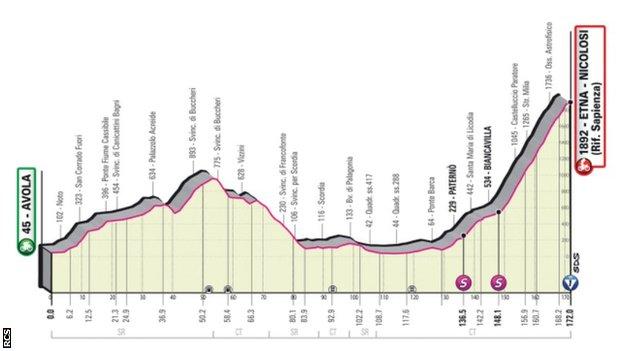
While Mount Etna may come into view early in the race, by the time the peloton reaches its summit, the riders will have spent almost 40km on an uncompromising climb to finish.
The start of the final climb sees the riders head up a relatively stable 7% gradient until things ramp up to 14% halfway up, meaning it is more than capable of inflicting some serious damage to the hopes of general classification contenders.
Sunday, 15 May – stage nine: Isernia – Blockhaus 191km
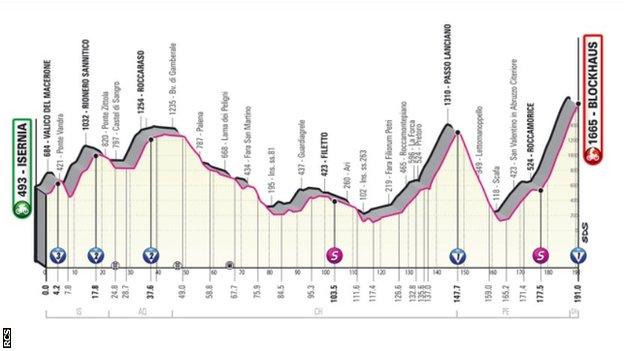
The ninth stage challenges the riders to tackle five categorised climbs on another punishing day in the saddle. The profile of the stage would seem to suit Carapaz and Yates, and could provide the first major barometer of how the Giro is going to play out.
Tuesday, 24 May – stage 16: Salo to Aprica, 202km
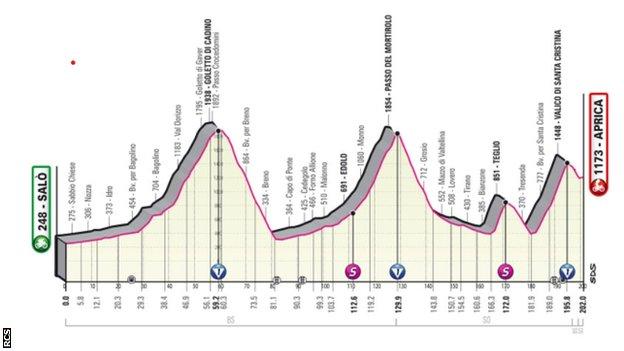
With three gruelling category one climbs and a couple of treacherous descents on the menu, this is arguably the peleton’s most difficult day in the mountains.
The Valico di Santa Cristina, the most severe climb of the stage, averages out at about 8% – but ratchets up to gradients of more than 12% in sections.
Wednesday, 24 May – stage 17 – Ponte di Legno – Lavarone 168km
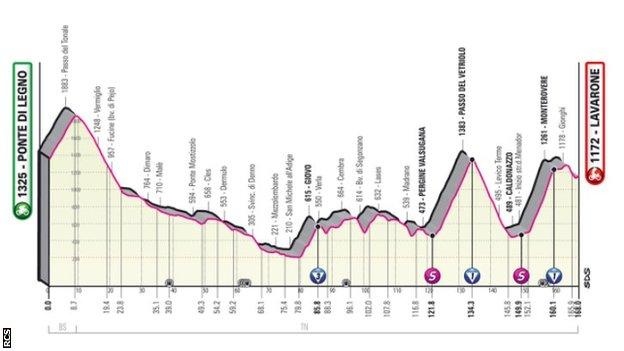
The Giro travels over four alpine peaks from Ponte di Legno to Lavarone – and as the third mountain stage in a row, it is likely to be where those near the top of the general classification standings are at their most vulnerable.
Sunday, 29 May – stage 21 – Verona (Cronometro delle Colline Veronesi) – Tissot ITT 17.4km
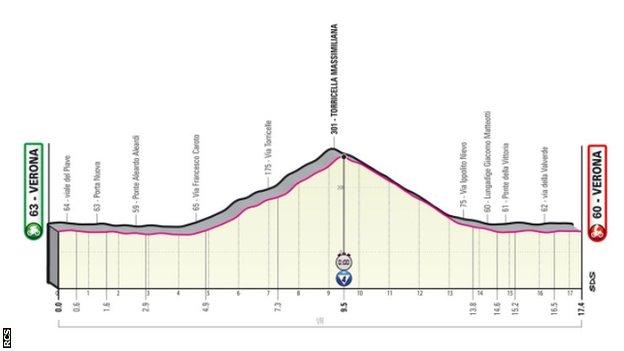
A day after the race climbs 2,000m above sea level on a daunting final mountain stage, it concludes in the same spot that Carapaz sealed his overall victory in 2019.


